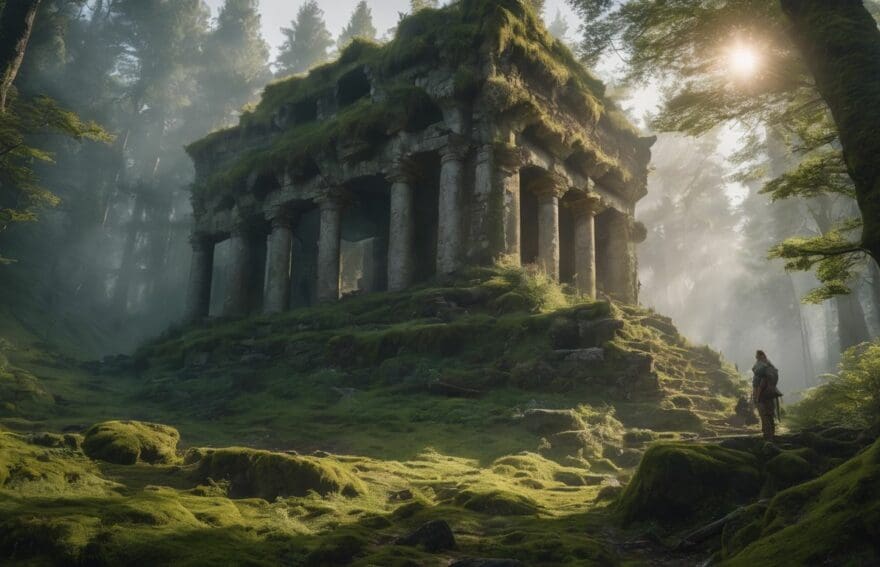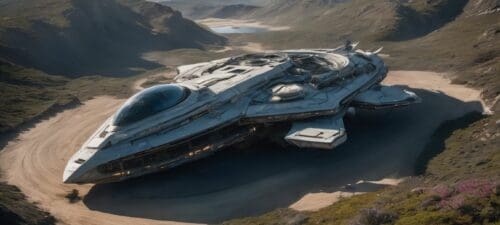God of War: A Father, A Son, and Norse Myths

Updated On: November 08, 2025 by James Connolly
Plunging into the legendary realm of ‘God of War’, it’s not merely about clashing with mythical creatures; it’s an emotive story, a heartfelt portrayal of a father-son bond. Like many others in Blighty, we’ve found ourselves intrigued by the nuanced narrative that threads through Kratos and Atreus’ shared odyssey.
Our piece delves deeper than ever before, unravelling the layers of their kinship against a backdrop resplendent with Norse lore—where figures like Odin stand as patriarchs to gods such as Thor and Baldur—to reveal profound insights on trust and paternal ties.
Join us as we uncover how this video game elevates beyond mere action-adventure, inviting players on an enlightening journey that reimagines heroism. Press on reading; it’s truly a tale too gripping to cast aside!
The Story of a Father and Son in God of War
Experience the deep bond between Kratos and his son Atreus as they face various challenges together on their quest. Their journey is filled with adventure, danger, and moments of growth that strengthen their relationship.
A deep bond between Kratos and his son Atreus
We journey with Kratos and Atreus, navigating the treacherous paths of Norse myths while strengthening their familial ties. The bond shared by father and son is at the heart of God of War’s narrative, where every challenge they confront brings them closer together.
As we guide Kratos through this rebirth in the icy realms ruled by a pantheon of Norse gods, his role as a parent becomes all-important; teaching Atreus about survival, trust, and understanding supernatural forces around them.
In our adventures across the frigid landscapes depicted in God of War, we witness tender moments that reveal more than just physical prowess—Kratos imparts knowledge and wisdom to his son.
They rely on each other for support against formidable enemies inspired by Greek mythology meeting its Nordic counterparts. This interaction lays bare emotions often unseen in epic quests—a testament to director Cory Barlog’s vision for a game deeply rooted in both adventure and fatherhood.
The challenges they face together
Kratos and Atreus face numerous challenges throughout their journey in God of War, testing both their physical abilities and their bond as father and son. They encounter formidable foes from Norse mythology, such as trolls, ogres, and dragons.
Additionally, they must navigate the intricate dynamics of the pantheon of gods that dominate the world around them. Their quest is further complicated by Atreus’ discovery of his true identity, adding emotional complexity to their relationship.
The duo also grapples with the burden of fulfilling prophecies foretelling Ragnarok – a fate they are determined to alter. The immense pressure on Kratos to guide his son through these trials while concealing critical elements about Atreus’ heritage adds another layer to the challenges they confront together.
Norse Mythology in God of War
The game draws inspiration from Norse myths, featuring gods like Odin and Thor, as well as creatures like the World Serpent. It immerses players in a world full of rich mythology and lore to explore.
How the game draws inspiration from Norse myths
Drawing inspiration from Norse myths, God of War immerses players in a rich tapestry of gods, creatures, and legends. The game beautifully integrates elements from Norse mythology, incorporating iconic figures such as Odin and Thor while staying true to their traditional depictions.
This allows players to experience the grandeur and depth of Norse mythology through compelling storytelling and breathtaking visuals that bring these ancient tales to life on the PlayStation platform.
Kratos’ journey intertwines with the intricate web of Norse mythology, presenting an engaging narrative that captures the essence of this storied tradition. From encounters with powerful deities to battles against mythical beasts like Jörmungandr, the game seamlessly weaves together its plot with key components found in classic Norse legends.
Gods and creatures from Norse mythology featured in the game
Drawing inspiration from Norse mythology, God of War is rich with gods and creatures that players encounter on their journey through the game. Here’s a look at some of the key elements from Norse mythology that are featured in the game:
- Kratos and Atreus encounter powerful Norse gods such as Odin, Thor, Freya, and Baldur, each with their own unique abilities and personalities.
- The game features iconic creatures from Norse mythology like Jörmungandr, the world serpent; Fenrir, the monstrous wolf; and Dwarves known for their exceptional craftsmanship.
- Players also come across other mythical beings such as Valkyries, powerful female warriors who serve Odin, adding an extra layer of depth to the game’s lore.
- Throughout their journey, Kratos and Atreus interact with ancient spirits known as the “Spirits of Vanaheim,” immersing players further into the rich tapestry of Norse mythology.
- The game introduces players to trolls – massive adversaries drawn from Norse folklore – providing exciting combat encounters set against a backdrop steeped in mythological significance.
Fatherhood and Trust in God of War
Kratos’ struggles as a father and Atreus’ growth and realisation of his true identity are central to the storyline. Trust is a major theme in their relationship, as they navigate their way through the challenges they face together.
Kratos’ struggles as a father
Kratos faces immense challenges as a father, trying to guide and protect his son Atreus in the harsh world of Norse mythology. His violent past and inner turmoil pose obstacles in connecting with Atreus on an emotional level, often straining their relationship.
Balancing his tumultuous history with the responsibilities of parenthood becomes an ongoing struggle for Kratos, shaping the compelling narrative of God of War.
The game delves deep into Kratos’ internal conflicts and efforts to be a better father while navigating through a new mythological setting. This exploration resonates with players, shedding light on the complexities of fatherhood and trust amidst adversity.
Atreus’ growth and realisation of his true identity
Atreus grows and matures significantly throughout the game, realising his true identity as Loki, the trickster god in Norse mythology. His journey of self-discovery is intertwined with the overarching narrative of God of War, adding depth and complexity to his character.
As players guide Atreus through his personal development, they witness him grapple with newfound powers and responsibilities, transforming from a curious boy into a pivotal figure in the game’s mythological landscape.
The realisation of Atreus’ true identity not only shapes his individual growth but also has far-reaching implications for both the gameplay and storyline. His evolution from an inexperienced youth to embracing his role as Loki showcases the multifaceted nature of father-son relationships within Norse mythology.
How trust is an important theme in their relationship
Trust is a central theme in the relationship between Kratos and Atreus in God of War. Kratos, as a father, grapples with trusting his son to handle the responsibilities that come along their journey through Norse mythology.
Atreus, on the other hand, seeks validation from his father by proving himself trustworthy amidst the challenges they face. Their evolving bond hinges on trust and support as they navigate the complexities of their journey together.
Kratos’ struggles encapsulate a profound exploration of building trust in a father-son dynamic while Atreus’ growth signals an important realisation – that trust forms an integral foundation for any relationship.
The Impact of Atreus’ Growing Role
Atreus’ growing role in God of War significantly impacts the overall plot and dynamic of the game. His character development and newfound capabilities have the potential to shape future games in the series, making him an integral part of the story.
Atreus’ significance in the overall plot of God of War
Atreus plays a pivotal role in the overall plot of God of War, contributing significantly to the development of the story. His growth and realisation of his true identity carry substantial weight in shaping the narrative and propelling the game forward.
As Kratos’ son, Atreus adds depth to the exploration of fatherhood and trust within the game, serving as a catalyst for character progression and emotional depth.
Atreus’ significance extends beyond just being Kratos’ son, as he actively participates in both combat and puzzle-solving elements throughout their journey. Additionally, his connection to Norse mythology becomes increasingly apparent as his abilities unfold over time.
The potential impact of his growth on future games
Atreus’ significance in the overall plot of God of War sets the stage for an exciting evolution in future games. His growth from a young, inexperienced character to one who embraces his true identity as Loki opens up endless possibilities for narrative development, gameplay mechanics, and exploration of Norse mythology.
As Atreus continues to mature and grapple with his newfound status and abilities, future games hold promise for deepening the father-son dynamic while introducing innovative twists to established lore.
The potential impact of Atreus’ growth on future games cannot be overstated. With his burgeoning knowledge of the intricacies within Norse mythology and the complexities of divine relationships, developers have ample room to expand on these narratives while taking players on an immersive journey through new realms teeming with intrigue and mystery.
Conclusion: Kratos and Atreus, a Dynamic Father-Son Duo in God of War
Kratos and Atreus forge a deep bond throughout God of War, navigating challenges together. In Norse mythology, the game draws inspiration from gods and creatures, adding depth to the storyline.
Kratos’ struggles as a father are central to the narrative, intertwined with themes of trust. Atreus’ growth significantly impacts the game’s overall plot and could influence future games in the series.
The dynamic relationship between Kratos and Atreus forms the heart of God of War’s compelling storytelling.
FAQs
1. What is “God of War: A Father, A Son, and Norse Myths”?
“God of War: A Father, A Son, and Norse Myths” is a gripping video game story that explores the relationship between a father and his son as they journey through a world steeped in the ancient myths of the Norse.
2. Can we learn about Norse mythology by playing God of War?
Yes, players can learn loads about Norse myths as they play God of War because it includes many characters and stories from these ancient tales.
3. Is the theme of family important in God of War?
Absolutely! The bond between father and son drives the whole storyline in God of War, showing us their struggles and growth together.
4. Who faces challenges in this mythical world?
Both Kratos, the father warrior with a storied past, and Atreus, his curious son eager to learn about their cold but fascinating realm filled with gods get tested on their thrilling adventure.









